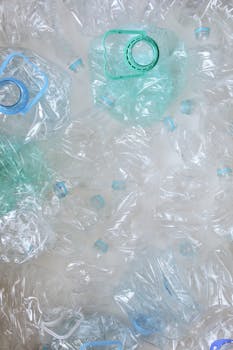
**
The United Arab Emirates (UAE), a nation renowned for its forward-thinking policies and sustainable initiatives, has launched a groundbreaking Extended Producer Responsibility (EPR) pilot program. This ambitious project aims to significantly improve the management of electronic waste (e-waste) and packaging waste, tackling a growing environmental challenge and positioning the UAE as a leader in circular economy practices. The pilot, focusing on key emirates, represents a crucial step towards a cleaner, more sustainable future for the region and serves as a model for other nations grappling with similar waste management issues.
Tackling the UAE's E-waste and Packaging Waste Crisis
The UAE, like many rapidly developing nations, faces a mounting challenge with electronic and packaging waste. The increasing consumption of electronics, from smartphones and laptops to larger appliances, generates a substantial amount of e-waste annually. Similarly, the booming e-commerce sector and rising consumerism have led to a surge in packaging waste, contributing to landfill overflow and environmental pollution. Improper disposal of this waste poses severe risks, including:
- Soil and water contamination: Toxic materials leaching from e-waste and improperly disposed packaging can contaminate soil and water sources, harming ecosystems and potentially human health.
- Greenhouse gas emissions: Landfill decomposition of certain materials contributes to greenhouse gas emissions, exacerbating climate change.
- Resource depletion: Valuable resources embedded in e-waste are often lost to landfills, hindering the transition to a circular economy.
- Health hazards: Exposure to toxic materials in e-waste can lead to various health problems, affecting both workers involved in informal recycling and the wider population.
The Extended Producer Responsibility (EPR) Approach
The UAE's pilot program adopts the EPR model, a globally recognized strategy for waste management. Under EPR, producers (manufacturers, importers, and brands) are held responsible for the entire lifecycle of their products, including their end-of-life management. This responsibility extends to the collection, recycling, and proper disposal of their products once they reach the end of their useful life. The EPR scheme aims to:
- Incentivize sustainable design: Producers are encouraged to design products that are easier to recycle, repair, and reuse, minimizing waste generation from the outset.
- Increase recycling rates: By making producers accountable for the end-of-life management of their products, EPR schemes aim to significantly boost recycling rates.
- Reduce landfill waste: Diverting waste from landfills is a core objective of EPR, reducing the environmental impact associated with landfill disposal.
- Promote innovation in recycling technologies: EPR can stimulate innovation in recycling technologies and processes, leading to more efficient and effective waste management solutions.
The UAE EPR Pilot Program: Key Features and Objectives
The UAE's EPR pilot program is a phased rollout, starting with a focus on specific product categories within chosen emirates. The initial phase will likely concentrate on:
- Specific electronic products: This might include smartphones, laptops, televisions, and refrigerators, which represent a significant portion of e-waste.
- Common packaging materials: Focus areas could include plastic packaging, cardboard, and glass, representing a significant percentage of the packaging waste stream.
The program will likely include a range of measures:
- Producer registration and compliance: Producers will be required to register with a designated authority and comply with established standards for waste collection and recycling.
- Take-back schemes: Producers will be responsible for establishing efficient take-back systems for their products at designated collection points.
- Recycling targets: The program will set ambitious recycling targets for participating producers, incentivizing them to improve their waste management practices.
- Monitoring and enforcement: A robust monitoring and enforcement system will ensure that producers comply with the regulations.
- Public awareness campaigns: Raising public awareness about proper e-waste and packaging waste disposal methods is crucial for the program's success.
Benefits and Challenges of the UAE's EPR Initiative
The UAE's EPR pilot program holds immense promise for improving the country's waste management landscape. The anticipated benefits include:
- Reduced environmental pollution: Proper management of e-waste and packaging waste will significantly reduce environmental pollution and protect natural resources.
- Improved public health: Minimizing exposure to toxic materials in waste will contribute to improved public health.
- Economic opportunities: The program can create new economic opportunities in the recycling and waste management sectors, generating jobs and stimulating innovation.
- Enhanced international reputation: The initiative positions the UAE as a global leader in sustainable waste management, enhancing its international reputation.
However, the implementation of such a large-scale program presents certain challenges:
- High initial investment: Establishing efficient collection and recycling infrastructure requires significant upfront investment.
- Ensuring producer compliance: Effective enforcement mechanisms are needed to ensure compliance from all producers.
- Public participation: Public awareness and cooperation are essential for the program's success.
- Technological advancements: Continued technological advancements in recycling technologies are needed to enhance efficiency and effectiveness.
Conclusion: A Step Towards a Circular Economy
The UAE's launch of its EPR pilot program marks a significant step towards building a more circular economy. By holding producers accountable for the end-of-life management of their products, the initiative seeks to tackle the growing problem of e-waste and packaging waste while promoting sustainable practices. While challenges exist, the potential benefits – environmental, economic, and social – are substantial. This bold initiative sets a powerful example for other nations striving to improve their waste management strategies and embrace a more sustainable future. The success of this pilot program will undoubtedly influence the broader adoption of EPR policies globally, highlighting the UAE’s commitment to environmental stewardship and innovation. Further updates and announcements concerning the program’s progress and expansion are eagerly anticipated.




















